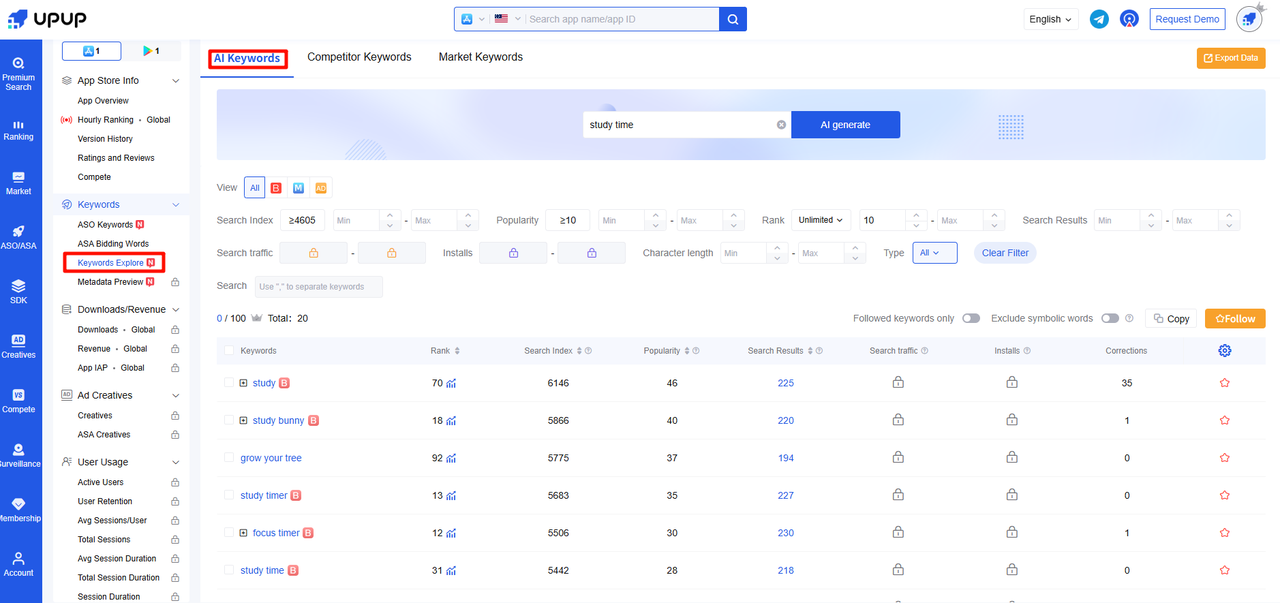ASO School
You can learn about ASO, App marketing, app store optimization and app promotional strategies here and gain the latest app market news and analysis. Helping you to carry out app store optimization and promote app data growth.
ASO Optimization Core: A Practical Guide to Seed Keyword Research
2025-06-10
Master the underlying logic of ASO! This article dissects 5 key methodologies for seed keyword research, using real-world cases like Airbnb. It details the end-to-end process from user needs to competitor analysis. Includes professional tool applications and keyword expansion strategies to help developers capture precise traffic, boost App Store/Google Play rankings, and increase download conversions.
Seed Keywords: The Foundational Traffic Code of ASO
In a competitive landscape with millions of daily searches across global app stores, ASO (App Store Optimization) is essential for acquiring organic traffic. Seed keyword research, as the starting point of ASO, directly determines an app's initial positioning in search results and user reach efficiency.
1. Definition and Characteristics of Seed Keywords
Seed keywords are an app's core "traffic anchors," characterized by three traits:
-
Functional Directness: Directly describe the app's core value.
-
Brand Association (for mature products): Integrate the brand name to strengthen recognition.
-
Short-Tail Nature: Typically concise expressions of 1-3 words, forming the basis for long-tail keyword expansion.
Case: Airbnb initially locked onto core demand with seed keywords like "rental," later expanding to long-tail terms like "short term rental" to capture niche scenario traffic.
2. Seed Keywords vs. Long-Tail Keywords
Seed keywords and long-tail keywords form a "trunk-branches" traffic ecosystem.
-
Seed Keywords: Define the app's "traffic foundation," using concise words to target core needs (e.g., "photo editing," "budgeting" for utility apps).
-
Long-Tail Keywords: Enable precise traffic capture by extending into scenario-specific needs (e.g., "ai photo editing," "business accounting software").
Studies show long-tail keywords contribute over 60% of app store downloads, while seed keywords act as the "trigger" for long-tail traffic.
Five Seed Keyword Research Methodologies (With Tools & Case Studies)
1. Product Value Deconstruction: Translating Features into User Language
-
Core Logic: Convert technical product language into user search language, avoiding self-indulgent naming.
-
Step 1: Pain Point Inventory: List the primary user pain points solved or core values provided (e.g., "efficiency boost," "workflow simplification" for tools).
-
Step 2: User Perspective Simulation: Based on target user personas (age, profession, usage scenarios), deduce their App Store search habits – brainstorm how users would describe needs in everyday language to form an initial seed keyword list.
-
Tool: Use AnswerThePublic to generate question-based keywords, validating real-world demand expression.
Case: Notion analyzed user feedback to identify "knowledge base building" and "personal productivity management" as high-demand needs. They expanded from the seed keyword "note taking" to terms like "ai notes," aligning with user intent and boosting search rankings by 30%.
2. User Voice Mining: Extracting Real Needs from Feedback
-
App Store/Google Play Review Analysis: Extract high-frequency terms from positive & neutral reviews using ASO tools like UPUP's review themes & phrases feature. E.g., A budgeting app found "budgeting app free" mentioned 1000+ times, adding it to their seed pool.
-
Customer Support Data Mining: Analyze problem descriptions in user queries (e.g., "Is there a photo editor that includes both body editing and face editing features?" yielding keywords like "photo editor body," "photo editor face").
Case: Canva analyzed user queries, identified strong demand for "design cover," added the seed keyword "cover art maker," driving a 45% increase in related search traffic.
3. Competitor Reverse Engineering: Leveraging Top Player Strategies
-
Identify Competitor Matrix: Direct competitors (high feature overlap), indirect competitors (solve the same need).
-
Metadata Deconstruction: Use ASO tools (e.g., UPUP) to scrape competitor titles & keyword fields. E.g., The title "Forest: Focus for Productivity" includes core terms "focus," "Productivity."
-
Differentiated Review Analysis: Examine competitor negative reviews for missing features, potentially informing your unique keywords.
4. Search Suggestions & Related Terms: Cross-Domain Inspiration
-
Store Auto-Suggestions: Search a primary keyword (e.g., "budgeting") in App Store/Google Play, noting suggested terms (typically 3-5 word long-tails) in the dropdown – these reflect actual user search habits.
-
Cross-Borrow SEO Tools: Tools like Google Keyword Planner (designed for web SEO) can inspire ASO keyword selection via "related keywords" (e.g., "fitness" spawning "fitness plan," "fitness tracker").
5. AI Keyword Expansion: Data-Driven Precision
-
Tool: UPUP's "AI Keywords" feature: Input core keywords to generate masses of highly relevant long-tail terms instantly. Efficiently expands coverage and precisely matches user search patterns. Provides key metrics like search volume, popularity, and tracks competitor keyword rank fluctuations.

Golden Rules for Seed Keyword Selection: 4 Steps to High-Value Terms
After generating hundreds of candidates, filter using these dimensions:
-
Relevance First: Exclude high-traffic terms unrelated to app functionality.
-
Search Volume vs. Competition Balance:
-
New Apps: Prioritize "medium search volume + low competition" blue ocean terms (e.g., "budgeting apps").
-
Mature Apps: Target "high search volume + medium competition" terms (e.g., "free budgeting apps").
-
-
Conversion Intent Match: Distinguish "informational searches" from "download-intent searches." E.g., "budgeting" has ambiguous intent; "free budgeting apps" has higher conversion potential.
-
A/B Testing Validation: Insert candidate keywords into metadata, monitor impression & tap changes over 7 days. Discard terms generate high impressions (e.g., 2000) but zero downloads.
From Seed to Ecosystem: Building a Dynamic Keyword Framework
1. Long-Tail Keyword Expansion Strategy
Example using the seed keyword "fitness" targeting China rankings:
-
Level 1: "fitness app," "fitness tracker"
-
Level 2: "ihome fitness health," "mind body fitness"
-
Level 3: "free fitness apps for women"
2. Metadata Optimization Tactics
-
Title Optimization: Be concise. Place highest-priority keywords in the title.
-
Layered Keyword Selection: Core Terms (category demand) + Competitor Terms (Top 3 brand names, use compliantly) + Long-Tail Terms.
-
iOS Strategy: Avoid stuffing. Cover main terms + specific scenarios (e.g., add "AI" for "English learning" apps).
-
Google Play Strategy: Naturally integrate 1-2 core keywords per 100 characters. Use a "Problem-Solution" structure. Avoid Stuffing: Google Play prioritizes semantic coherence; unnatural repetition harms ranking.
-
🌟 iOS Weighting: Title > Subtitle > 100-char Keyword Field. Google Play Weighting: Title > Short Description > Long Description.
3. Data-Driven Iteration
-
Use ASO tools (e.g., UPUP) daily to monitor trends. Update keyword libraries seasonally/around events (e.g., "travel," "rental" fluctuate).
-
Analyze "Keyword Conversion" reports to see which terms drive actual downloads. Continuously refine your strategy.
Conclusion: The Long-Term Value of Seed Keywords
Seed keyword research is not a one-off task, but an ongoing "traffic infrastructure" requiring iteration. Cases like Airbnb breaking geographical limits with scenario-based keywords, or Canva reshaping search entry points using user language, prove that precise seed keywords reduce initial optimization costs and provide fertile ground for long-tail traffic growth.
Action Plan:
-
Dedicate 1 week to competitor keyword analysis & user review mining to build your initial keyword library.
-
Prioritize optimizing seed keywords in your title & subtitle. Monitor search rank changes over 7 days.
-
Update your keyword strategy quarterly based on industry trends (e.g., AI, AR applications).
Mastering the art of seed keyword research is key to gaining an edge in the app store traffic competition. AppFast specializes in App Store & Google Play keyword ranking optimization. We provide end-to-end solutions for developers, from keyword research to ranking boosts. Using professional tools, we analyze industry trends and competitor strategies to pinpoint high-value seed and long-tail keywords. Combined with metadata optimization and compliant tactics, we can elevate target keywords to Top 1-5 rankings within 3-7 days (timeline varies by industry competition and keyword volume). Initiate a keyword audit with AppFast's professional ASO services today and make your app the first choice in user searches.
Navigation
Free consultation with ASO specialists
Doing ASO for the first time or have no idea how to carry out targeted optimization of your app?
We offer one-on-one customized services provided by app marketing specialists
Related recommendations
Copyright © 2018 - 2021 AppFast Company, LLC. All Rights Reserved. The AppFast word mark is a
registered trademark of AppFast Company, LLC in the US and other countries.

